2013年中考英语 语法知识盘点 第7讲 形容词和副词课件
文档属性
| 名称 | 2013年中考英语 语法知识盘点 第7讲 形容词和副词课件 |
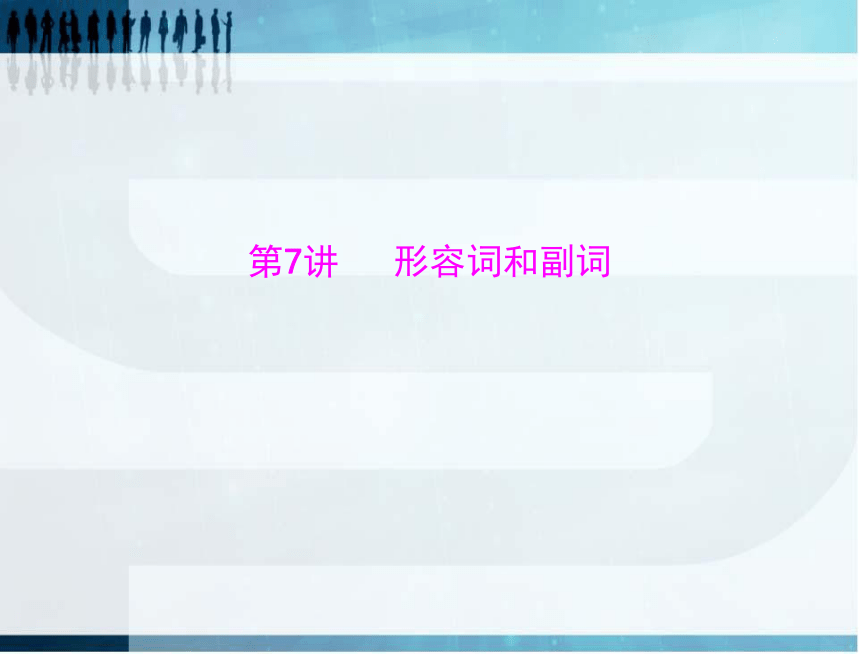
|
|
| 格式 | zip | ||
| 文件大小 | 229.2KB | ||
| 资源类型 | 教案 | ||
| 版本资源 | 通用版 | ||
| 科目 | 英语 | ||
| 更新时间 | 2013-01-03 00:00:00 | ||
图片预览

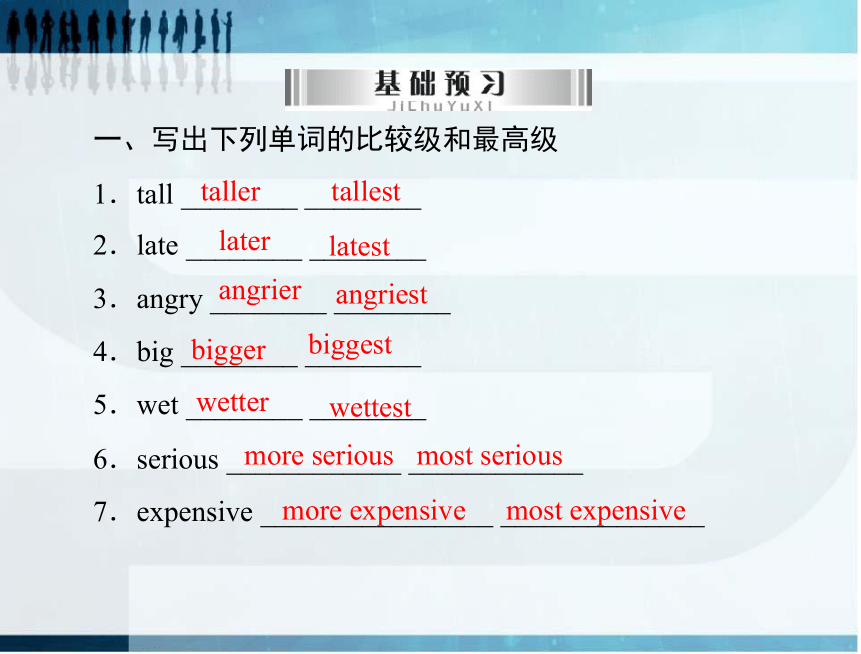
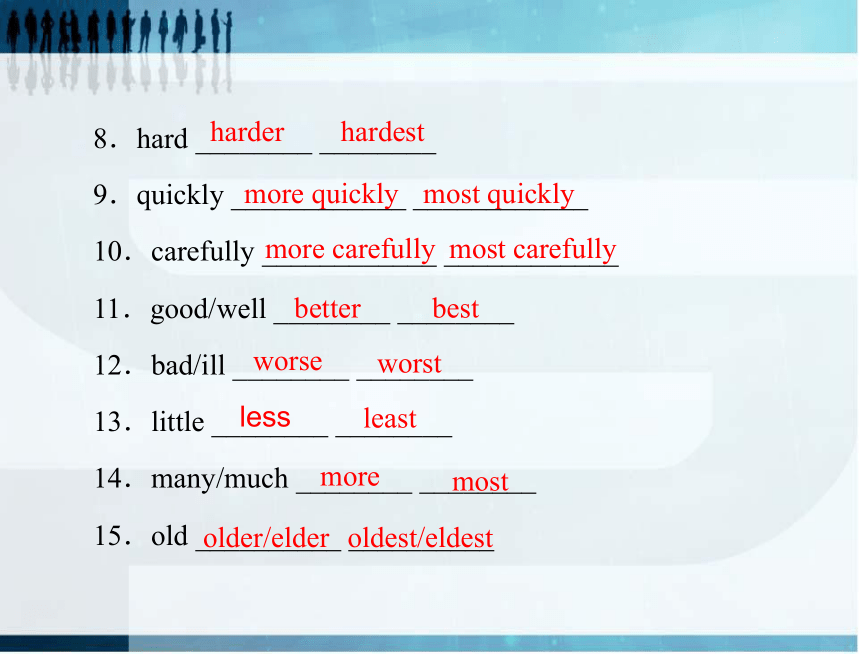
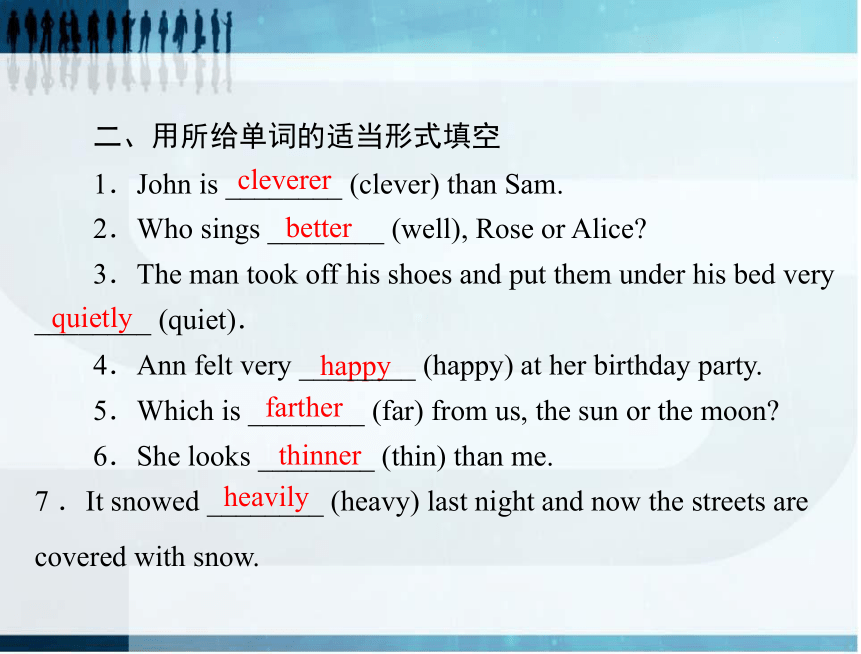
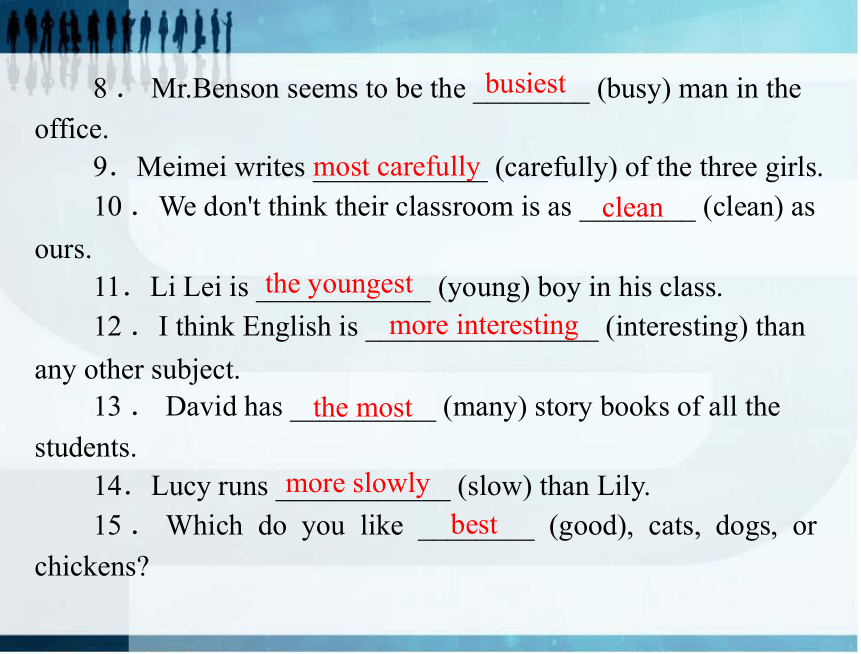
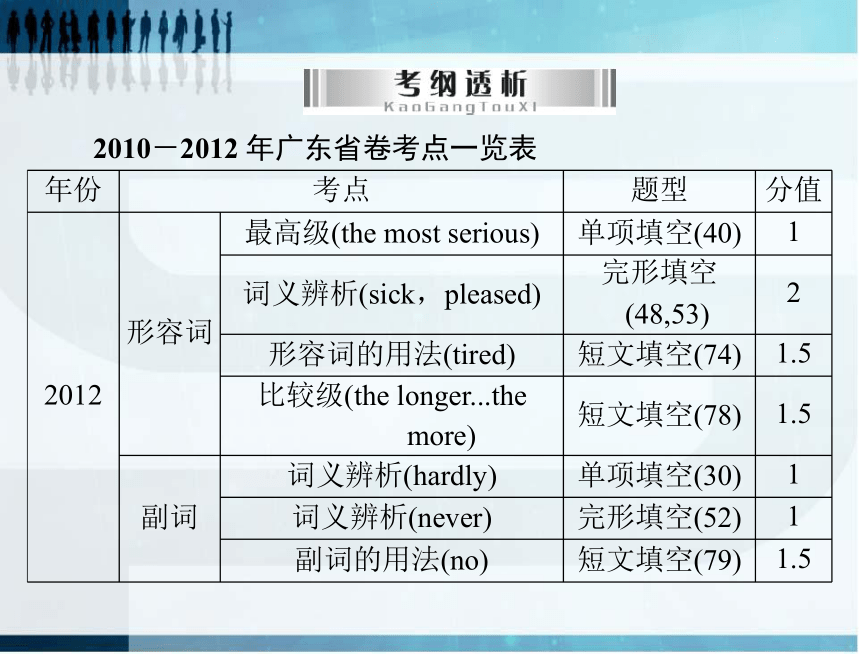
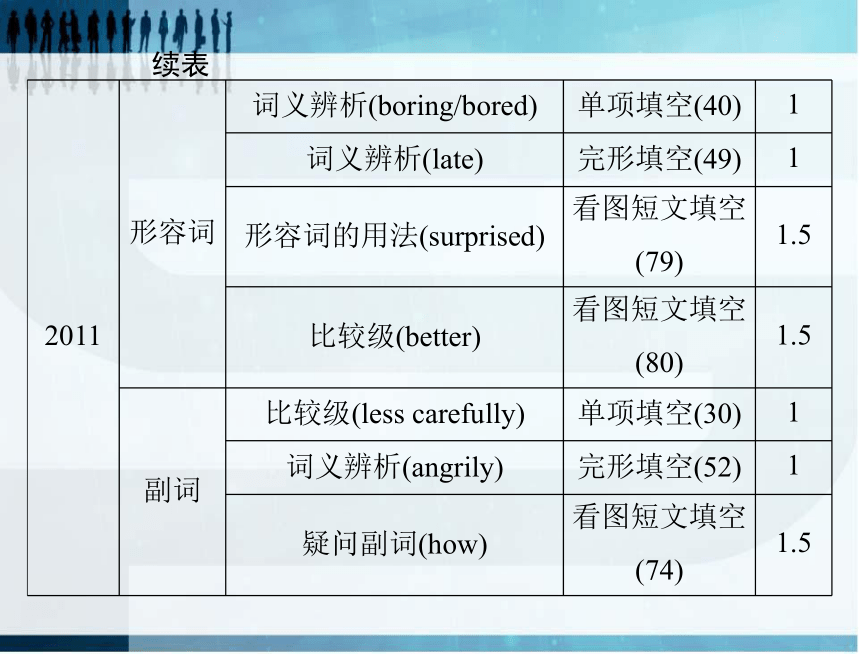
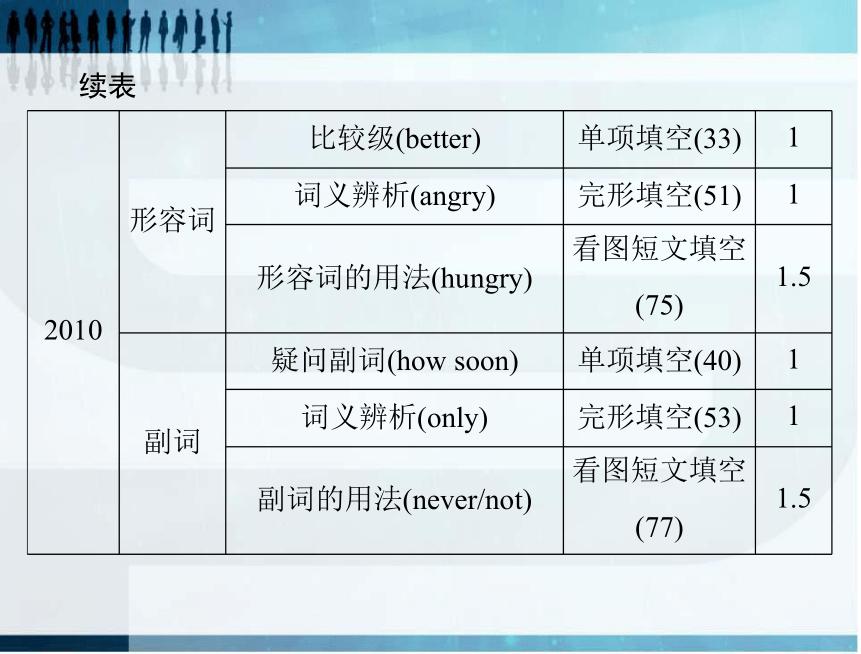
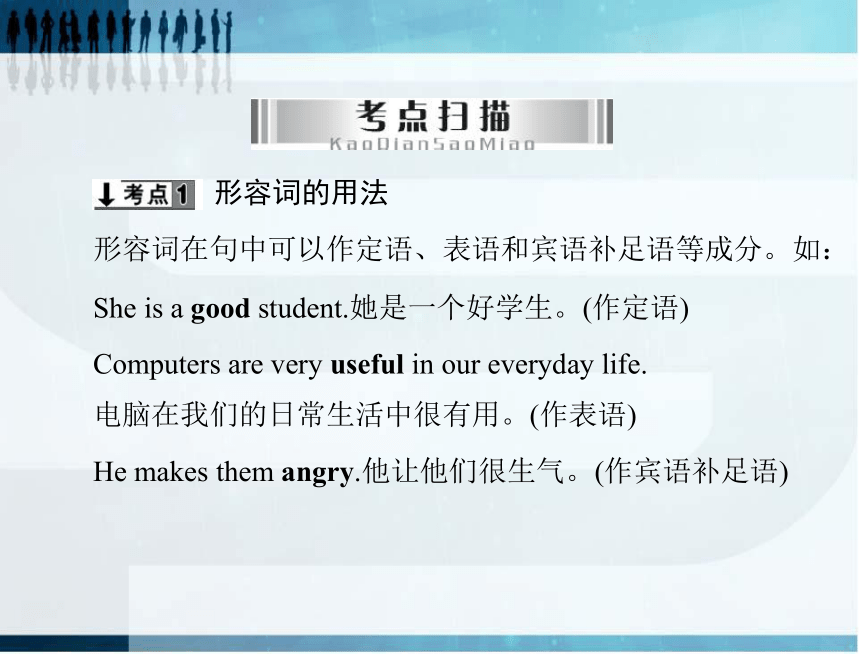
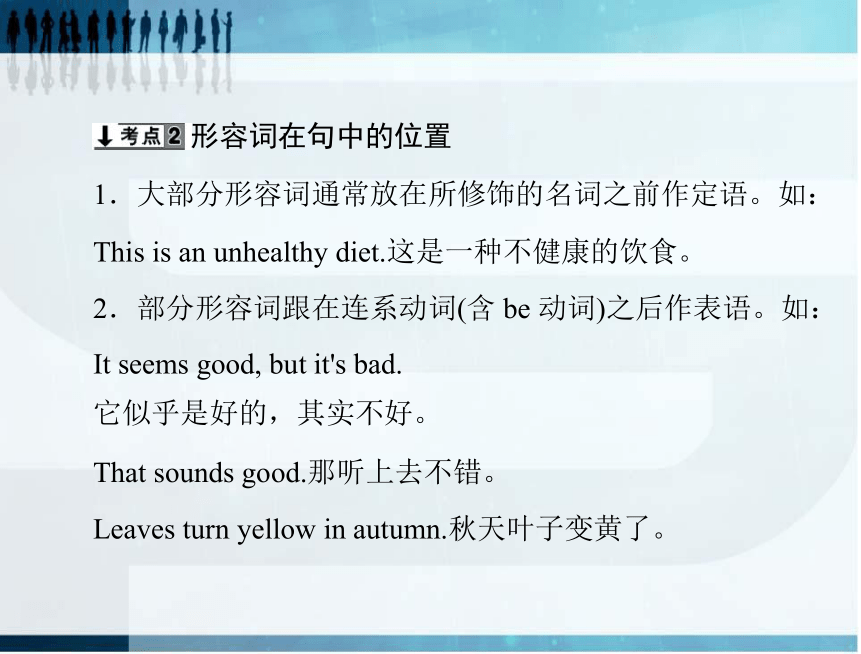
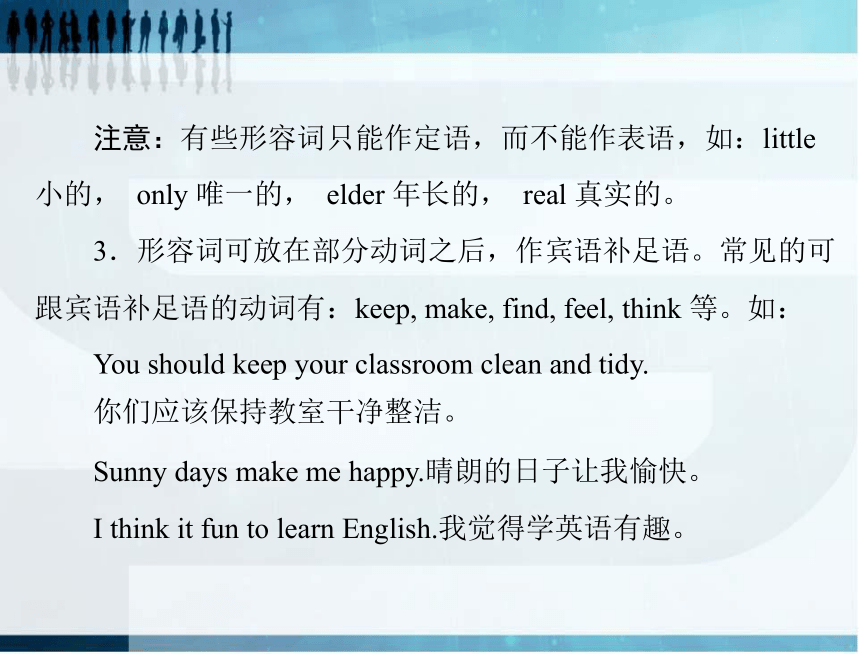
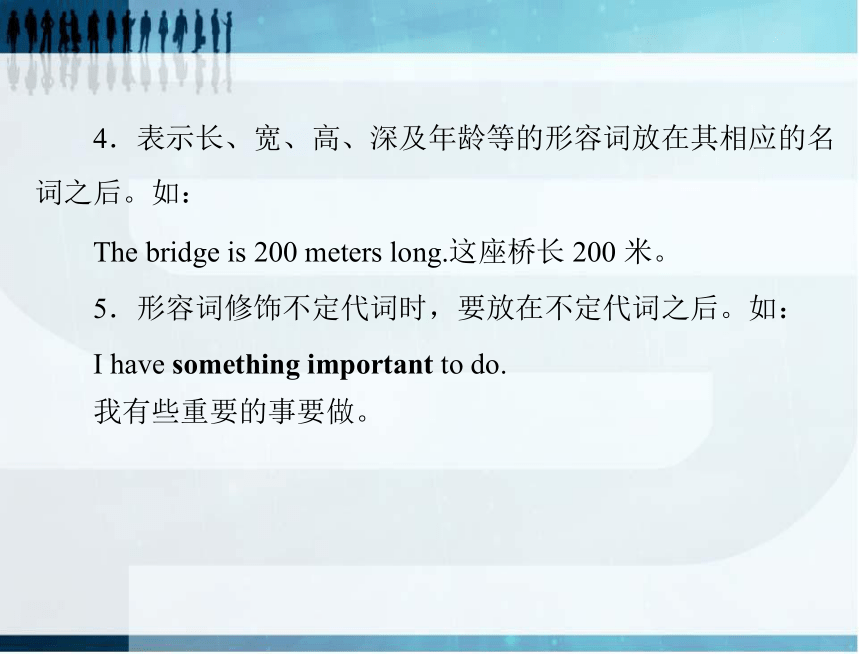
文档简介
课件75张PPT。第7讲形容词和副词一、写出下列单词的比较级和最高级1.tall ________ ________
2.late ________ ________
3.angry ________ ________
4.big ________ ________
5.wet ________ ________
wetter
wettest6.serious ____________ ____________more serious7.expensive ________________ ______________most seriousmore expensivemost expensivetallertallestlater
latestangrier
angriestbiggerbiggest
harderhardestmore quicklymost quickly8.hard ________ ________more carefullymost carefully9.quickly ____________ ____________
10.carefully ____________ ____________11.good/well ________ ________
12.bad/ill ________ ________
13.little ________ ________
14.many/much ________ ________
more
most15.old __________ __________older/elderoldest/eldestbetterbest
worse
worstless
least二、用所给单词的适当形式填空1.John is ________ (clever) than Sam.cleverer2.Who sings ________ (well), Rose or Alice?better3.The man took off his shoes and put them under his bed very________ (quiet).quietlyhappyfarther4.Ann felt very ________ (happy) at her birthday party.
5.Which is ________ (far) from us, the sun or the moon?6.She looks ________ (thin) than me.thinner7 .It snowed ________ (heavy) last night and now the streets arecovered with snow.heavily8 . Mr.Benson seems to be the ________ (busy) man in theoffice.busiestmost carefully9.Meimei writes ____________ (carefully) of the three girls.
10 .We don't think their classroom is as ________ (clean) asours.cleanthe youngest11.Li Lei is ____________ (young) boy in his class.
12 .I think English is ________________ (interesting) thanany other subject.more interestingthe most13 . David has __________ (many) story books of all thestudents.more slowlybest 14.Lucy runs ____________ (slow) than Lily.
15 . Which do you like ________ (good), cats, dogs, or
chickens?2010-2012 年广东省卷考点一览表续表续表形容词的用法形容词在句中可以作定语、表语和宾语补足语等成分。如:
She is a good student.她是一个好学生。(作定语)Computers are very useful in our everyday life.电脑在我们的日常生活中很有用。(作表语)He makes them angry.他让他们很生气。(作宾语补足语)形容词在句中的位置1.大部分形容词通常放在所修饰的名词之前作定语。如:
This is an unhealthy diet.这是一种不健康的饮食。2.部分形容词跟在连系动词(含 be 动词)之后作表语。如:It seems good, but it's bad.它似乎是好的,其实不好。That sounds good.那听上去不错。Leaves turn yellow in autumn.秋天叶子变黄了。注意:有些形容词只能作定语,而不能作表语,如:little小的, only 唯一的, elder 年长的, real 真实的。 3.形容词可放在部分动词之后,作宾语补足语。常见的可
跟宾语补足语的动词有:keep, make, find, feel, think 等。如:You should keep your classroom clean and tidy.
你们应该保持教室干净整洁。Sunny days make me happy.晴朗的日子让我愉快。
I think it fun to learn English.我觉得学英语有趣。4.表示长、宽、高、深及年龄等的形容词放在其相应的名词之后。如:The bridge is 200 meters long.这座桥长 200 米。5.形容词修饰不定代词时,要放在不定代词之后。如:I have something important to do.
我有些重要的事要做。形容词原级的用法副词的分类 副词主要用来修饰动词、形容词、副词或句子,表示时间、
地点、方式和程度等概念。按其词汇意义一般分为以下五类: 副词的构成
1.大部分形容词加后缀-ly 构成副词。如:quiet—quietlyquick—quicklybad—badly usual—usually
careful—carefully strong—strongly
simple—simply terrible—terribly
true—truly full—fully
busy—busily easy—easily
happy—happily heavy—heavily 注意:有些以-ly 结尾的词并不是副词,实际上只能作形容
词。如:friendly (友好的), lovely (可爱的), lonely (孤独的), likely
(很可能的), lively (活泼的), ugly (丑陋的),等等。
2.有些形容词与副词同形。如:early adj.早的adv.早daily adj.每日的,日常的adv.每天 fast adj.快的;迅速的;紧密的 adv.快地;迅速地;紧密
地hard adj.硬的;困难的;艰难的adv.努力地;使劲地;猛烈地 注意:有些词虽然既可作形容词也可作副词,但加了-ly 之
后意义相差很大。如:adv.努力地;使劲hard adj.硬的;困难的;艰难的
地;猛烈地
hardly adv.几乎不adv.迟地,晚地late adj.迟的,晚的
lately adv.近来副词在句中的位置 1.副词常放在行为动词或形容词后面,但表示程度或频率
的副词一般放在 be 动词、助动词、情态动词之后,行为动词之
前。如:The boy speaks English well.这个男孩英语说得很好。
Tom is often late for school.汤姆上学经常迟到。2.副词 very 可以修饰形容词,但不能直接放在动词前面来修饰动词。如:(×)Mr.Smith very works hard.
(√)Mr.Smith works very hard.
史密斯先生工作非常努力。 3.作副词时,enough 要放在所修饰的形容词、副词的后
面;作形容词时,enough 则放在名词前后均可。如:I ran fast enough so that I could take a No.2 bus.我跑得足够快以便能乘到 2 路公交车。There isn't enough meat for us to eat.
没有足够的肉给我们吃。注意:副词前一般不加介词。形容词和副词的比较级和最高级的构成1.规则变化续表续表2.不规则变化形容词和副词的比较级和最高级的用法1.比较级的用法(1)“A +动词(+倍数)+比较级+than+B”表示“A 比B……”或“A 比 B……几倍”。如:This bag is three times bigger than that one.
这个袋子比那个大三倍。I got up earlier than my mother today.
我今天比我妈妈早起床。(2)“特殊疑问词+动词+比较级,A or B?”表示“A 和B,哪个更……”。如:Which is more interesting, cycling or running?
骑自行车和跑步,哪个更有趣?Who draws better, Jenny or Danny?
谁画得比较好,詹妮还是丹尼? (3)“ 比较级+than+any other+单数名词 (+介词短
语)”,表示“比同一范围的任何一个人/物都……”,可表示最
高级的含义。如:The Yangtze River is longer than any other river in China. 长江比中国其他任何一条河流都长。=The Yangtze River is the longest river in China.
长江是中国最长的河流。The pen writes more easily than any other pen.
这支钢笔比其他的都好写。=The pen writes the most easily.这支钢笔最好写。(4)“比较级+and+比较级”,表示“越来越……”。如:
He is getting taller and taller.他长得越来越高了。
He walks more and more quickly.他越走越快。(5)“the + 比 较 级 , the + 比 较 级 ” , 表 示 “ 越 ……越……”。如:The more careful you are, the fewer mistakes you'll make. 你越认真,犯的错误就越少。The more you learn, the more you'll know.
学得越多,你知道得就越多。(6)“否定词+比较级”,意为“最……不过”。如:
I can't agree more.我非常同意。She has never had a better dinner.
这是她吃过的最好的一顿饭。2.最高级的用法(三者或三者以上的比较)(1)“the +最高级+in/of 短语”,表示“……是……中最……的”。如:Tom is the tallest in his class.
汤姆是他们班上最高的。I jump farthest in my class.我是我们班跳得最远的。(2)“特殊疑问词+动词+the+最高级, A, B, or C?”用于三者以上的比较。如:Which country is the largest, China, America or Ca-nada ?中国、美国、加拿大,哪个国家最大?Which season do you like best, spring, summer or autumn ?春季、夏季和秋季,你最喜欢哪个季节?(3)“be one of the+形容词最高级+复数可数名词(+in/of短语)”,表示“……是……中最……之一”。如:English is one of the most important subjects in our school. 在我们学校,英语是最重要的科目之一。注意: (1) 有些程度副词,如:quite, rather, very, so, too, enough,
fairly 等,与形容词或副词连用时具有“比较”的含义,这时句
中的形容词或副词不能再使用比较级。(2)much, a little, still, even, a bit, a lot, far 可修饰形容词或副词的比较级。(3)若形容词最高级前有物主代词、指示代词、名词所有格等修饰,此时不用定冠词 the。
(4)副词最高级前的 the 可以省略。1.interesting 与 interested (1)interesting 表示事物本身是“有趣的,令人感兴趣的”。
作表语时,多用于“sth.be interesting”句型,主语通常是物;作
定语时,既可修饰人,也可修饰物。(2)interested 常表示某人对某物“感兴趣”,多用于“beinterested in doing sth.”句型;主语通常是人。
常见类似的-ing 形容词和-ed 形容词还有:surprising 令人惊讶的
exciting 令人兴奋的
pleasing 令人愉快的
frightening 令人恐惧的
moving 令人感动的 surprised 感到惊讶的
excited 感到兴奋的
pleased 感到愉快、满意的
frightened 感到恐惧的
moved 受感动的即景活用interestinginterested(1)I have an ______________ book.
(2)He is ______________ in the book. 2.ill 与 sick
两个词都可以表示“病的,生病的”的意思,都可以作表
语,但作定语时只能用 sick 而不能用 ill(ill 作定语时意为“坏
的”,而不是“病的”)。即景活用sickill(1)The ________man is his father.
(2)She has been ________ for three weeks. 3.alone 与 lonely
(1)alone 强调独自一人,常用作表语,作定语时置于名词后。
另外,alone 也可以用作副词,意思是“单独地,孤单地”,而
lonely 一般不作副词用。
(2)lonely 作表语时,表示“寂寞,孤独”,含有强烈的感
彩;作定语时含有“荒凉的”之意。即景活用alonelonelylonely(1)He lives________, but he doesn't feel________.
(2)The man lived in a ________island. 4.already, yet, still
(1)already 表示某事已经发生,主要用于肯定句句中,常
与完成时连用。
(2)yet 表示期待某事发生,主要用于否定句和疑问句句末,
常与完成时连用。
(3)still 表示某事还在进行,主要用于肯定句和疑问句句
中,有时也可用于否定句。即景活用alreadyyetstill(1)We've ____________ watched that film.
(2)I haven't finished my homework ________.
(3)He ________ works until late every night. 5.also, too, as well, either
(1)also 多用于书面语,放在肯定句和疑问句句中,一般与
动词连用。
(2)too 和 as well 多用于口语,一般放在肯定句和疑问句句
末。
(3)either 用于否定句和否定的疑问句,往往放在句末。即景活用tooeitheralso(1)I went there last night.He went there ________.
(2)He hasn't finished it, ________.
(3)She is young and beautiful, and ________ rich.6.how often, how long, how soon, how far, how many/much, how old(1)how often 意为“多久一次”,对动作发生的频率进行提问。(2)how long 意为“多长时间;(长度)多长”,对一段时间或物体的长度进行提问。(3)how soon 意为“多久以后”,对将来的一段时间进行提问,回答要用“in+一段时间”。(4)how far 意为“多远”,对距离进行提问。(5)how many/much 意为“多少”,对数量进行提问;howmuch 还可对价格进行提问。(6)how old 意为“多大”,对年龄进行提问。How farHow oftenHow soonHow many 即景活用
(1)—________________ is it from here to your school?
—About 20 minutes' walk.
(2)—________________ do you take a walk?
—Seldom.
(3)—________________ will your mother come back?
—In an hour.
(4)—________________ students are there in your class?
—Forty.
(5)—________________ do you do your homework every
day?—About two hours.How longHow old(6)—________________ is your little sister?
—She is only five.
(7)—________________ is this red coat?—It's 50 dollars.How muchquiteveryquitevery 7.quite 与 very
quite 和 very 都可表示程度,意为“很,十分”,用来
修饰形容词和副词,但 very 的语气更强。当与冠词连用时,quite
a+形容词+名词=a very+形容词+名词。
即景活用
(1)She is ________ a lovely girl.
(2)It was a ________ cold morning.
(3)He is ________ tall, but not ________ tall. 8.much too, too much, too many
(1)much too 意为“非常,极其;太”,much 和 too 都是副
词,中心词是 too,much 修饰 too,以加强语气,much too 修饰
形容词或副词原级。
(2)too much 意为“太多”,中心词是 much,too 修饰 much,
以加强语气。too much 修饰不可数名词,与 too many 相对,too
many 修饰可数名词。即景活用much tootoo muchtoo many (1)The skirt is ________________ dear.
(2)Please don't eat ________________ ice cream.It's bad for
your health.
(3)There are________________ people in the supermarket.9.so 与 such(1)so 修饰形容词和副词;such 修饰名词。(2)so 修饰的形容词后可以有一个单数的可数名词,其结构是“so+形容词+a/an+可数名词单数”。 (3)such 可以修饰可数名词单复数和不可数名词,名词前可
以有形容词作定语,其结构是“such+a/an+形容词+可数名词
单数”或“such+形容词+可数名词复数/不可数名词”。 (4)如果可数名词复数前有 many/few ,或不可数名词前有
much/little 修饰,则用 so 不用 such。即:
so many/few+可数名词复数
so much/little+不可数名词即景活用sosuch such(1)My brother runs ________ fast that I can't follow him.
(2)He is________ a boy.
(3)He is ________clever a boy.=He is ________a clever boy.suchsuch(4)It is ________ cold weather.
(5)They are________ good students.so()1.(2012 年广东)Eighteen kids died in the school busaccident in Gansu Province.It's ________ one that I have ever
heard of.A.a very serious
C.the most seriousB.a more serious
D.the least serious C 题意:在甘肃省,18 个孩子死于校车意外事故中,
这是我所听说过的最严重的一次。根据题意可知应选形容词的
最高级。故选 C。D 项不符合题意。()2.(2012 年广东)—Did you go to the cinema to see 3DTitanic last night? —No, I ________
expensive.
A. hardly
C.stillgo to the cinema.The tickets are too
B.nearly
D.onlyA题意:“昨晚你去电影院看了 3D 的《泰坦尼克号》吗 ?”“ 没 有 , 我 几 乎 不 去 看 电 影 , 因 为 电 影 票 太 贵
了。 ”hardly 几乎不;nearly 几乎,差不多;still 仍然;only
仅仅。根据题意可知选 A。()3.(2012 年广东广州)—Do you like this movie? —Yes, it's the ________ one I've ever seen.
A.better
B.best
C.good
D.well
B 题意:“你喜欢这部电影吗?”“这是我所看过的最
好的一部。”根据 ever 可知选 B。()4.(2012 年广东佛山)She prefers football because shethinks it's ________ among all sports.
A.interesting
B.more interesting
C.the most interesting
C 根据 among all sports 可知应用最高级,故选 C。()5.(2012 年广东梅州)Is this kind of pet ________ a petdog these days?
A.as trendy as
B.more trendier than
C.much trendy than
D.not so trendier as
A 题意:目前这种宠物跟宠物狗一样时髦吗?as+形容词
/副词原级+as...与……一样。故选 A。B、C 两项形式错误。()6.(2012 年 广 东 梅 州 )The Old Town of Lijiang is________ with tourists for its beautiful old buildings.A.popular
C.specialB.famous
D.Different A 题意:丽江古城因为它美丽而古老的建筑而受游客欢
迎。be popular with 受……欢迎,为……所喜爱;be famous with
因……而闻名;没有 be special/different with 这样的搭配。根据
题意可知应选 A。()7.(2012 年广东深圳)—Who will teach ________ oralEnglish next term?Can it be a new teacher?
—Perhaps.But our head teacher hasn't told us
________.A.your; already
C.you; alreadyB.you; yet
D.your; yet B teach sb.sth.教某人某物。其中 sb.为代词时应用其宾格
形式,故第一空选 you; already 一般用于肯定句中,yet 常用于
否定句和疑问句中,故第二空选 yet。()8.(2012 年广东湛江)—What's wrong with you today?—I am quite upset.
—Cheer up!The more you smile, the ________ you will feel.
A.happy
B.happier
C.happily
D.more happilyB“the +形容词比较级,the +形容词比较级”表示“越……越……”。故选 B。()9.(2011 年广东)—Steve is good at writing short stories. —So he is.But he writes ________ than us.So he can't get
good grades in writing.A.most carefully
C.less carefullyB.more carefully
D.least carefullyC由 than 可知应该用比较级,故排除 A、D 项。由最后一句“所以他不能在写作中拿高分”可知,应选 less carefully。()10.(2011 年 广 东 )—Have you ever seen the moviecalled Los Angeles 2011?
—Yes, but I think it's ________.I fell asleep when I saw it.
A. exciting
B.boring
C.bored
D.excited
B 由最后一句“我看的时候睡着了”可知,电影应该是
无聊的,排除 A、D 项;因为修饰的是电影,故选 B。()11.(2011 年广东清远)Li Hua studies English veryand her English is ________in her class.
A. careful; good
B.carefully; well
C.careful; best
D.carefully; the best
D 修饰动词 study 要用副词,排除 A、C 项。is 是系动词,
后边应接形容词而不是副词作表语,故选 D。()12.(2011 年广东肇庆)Do you think which language is________, Japanese or English?
A. difficult
B.the most difficult
C.more difficult
C 根据题意,Japanese 和 English 两者比较,应该用形容
词比较级形式。()13.(2011 年广东广州)The actress is already 50, but shelooks ________ than she really is.
A.young
B.more young
C.more younger
D.much youngerD由 than 可 知 此 句 用 比 较 级 , young 的 比 较 级 为younger,且比较级前可用 a little, much, even 等词修饰,故选 D。()14.(2011 年 广 东 茂 名 )Though it was raining hardoutside, we could see ________ people in the street.
A.few
B.a few
C.a little
B 题意:虽然下大雨,我们仍能在街上看到一些人。a
little 用于修饰不可数名词;few 几乎没有(含否定含义),a few
一些(含肯定含义),修饰可数名词。根据 though 可知表转折,
故选 B。()15.(2011 年广东茂名)—Who is the ________basketball player in China?
—Yao Ming, of course.No one plays ________ in our
country.B.better; better A. good; best
C.best; betterC题意:“谁是中国最好的篮球运动员?”“当然是姚明。在我国没有人(比他)打得更好。”表示三者以上比较用
最高级,故第一空用 best;表示两者比较用比较级,故第二空
用 better。()16.(2011 年 广 东 茂 名 )The people there are________.So they often talk ________.B.friendly; happily A. friend; happy
C.friend; happilyB题意:那儿的人很友善,因此他们交谈经常都很愉快。系动词 are 后用名词或形容词作表语,friend 是名词,其形
容词形式是 friendly;若接名词应用复数,排除 A、C 项。副词
happily 修饰动词 talk,故选 B。()17.(2011 年 广 东 佛 山 )—________ is the history ofTsinghua University?
—100 years.
A. How soon
B.How long
C.How far
B 由答语“100 年”可知是询问时间长短,故选 B。()18.(2011 年广东深圳)—There is a smile on Miss Gao'sface.She must be ________ with Sam's work.
—I think so.No one did as ________ as him in our class. A. angry; well
C.strict; goodB.pleasing; good
D.pleased; well D 题意:“高老师面带微笑,她应该对山姆的功课很满
意。”“我也这么认为。班上没人做得比他好。”be pleased with
对……感到满意;动词 did 应用副词 well 来修饰。故选 D。()19.(2011 年广东深圳)—The doctor told me ________too much, but I find it difficult.
—The doctor is right.The less you drink, ________ you will be.
A.don't drink; the healthier
B.not to drink; the healthier
C.not to drink; the more healthier
D.don't drink; healthier
B tell sb.not to do sth.告诉某人不要做某事,故可排除 A、
D 两项;“the+比较级,the+比较级”意为“越……越……”,
healthy 的比较级为 healthier,故选 B。()20.(2011 年广东梅州)—Mom, Bill is coming to dinnerthis evening.
—OK.Let's give him ________ to eat.
A.anything different
B.different anything
C.something different
D.different somethingCsomething 多用于肯定句,anything 多用于否定句和疑问句;形容词修饰不定代词时要后置。故选 C。( )21.(2010 年广东)—How are you feeling today?
—Much ________.I can go to school next week. A. good
C.bestB.better
D.wellB题意:“你今天觉得怎么样?”“好多了。我下周就能去学校了。”much 可用来修饰形容词/副词的比较级,表示
程度。故选 B。()22.(2010 年广东)—________ will you come back? —In an hour.
A.How soon
B.How often
C.How far
D.How long
A how far 多远;how long 多长;how often 多久一次;how
soon 多少时间以后,多久。由答语可知是对表示将来的时间状
语提问,应用疑问副词 how soon。()23.(2010 年广东肇庆)The busier he is, the ________he feels.
A. more happily
B.more happy
C.happierC“the +比 较级 ,the +比 较级 ” 表示 “越 ……就越……”。feel 是系动词,不能接副词构成系表结构。happy 的
比较级是把 y 变 i 再加-er,即 happier。()24.(2010 年 广 东 梅 州 )—Mum, could you buy me adress like this?
—Certainly, we can buy ________ one than this, but
________ this.A.a better; better than
C.a cheaper; as good as B.a worse; as good as
D.a more important; good asC题意:“妈妈,你能给我买一条这样的裙子吗?”“当然。我们可以买一条比这条便宜但和这条一样好的裙子。”A
项两个都用 better,没有转折含义;B 项前后矛盾;D 项形式错
误。故选 C。()25.(2010 年广东梅州)Can you imagine that ________little ants can carry ________ many big worms? A. so; so
C.such; so B.such; such
D.so; such C 当名词前有表示“多、少”的 many, much, few, little 的
形容词时,用 so 来修饰;若 little 表示“小的”,则用 such 修
饰。()26.(2010 年广东深圳)—________ is your opi-nion onthe film “Avatar”?
—It's amazing! I was ________ moved. A. What; deep
C.What; deeply B.How; deep
D.How; deeplyC“What's your opinion on/of... ?”意为“你觉得……怎么样?”第二空要用程度副词 deeply (深深地)来修饰形容词
moved。故选 C。()27.(2010 年 广东深 圳 )—________ people are takingaction to protect the environment now.
—Yes.________ of my classmates come to school by bike
now.A. More and more; Four fifth
C.More and more; Four fifthsB.Less and less; Four fifth
D.Less and less; Four fifthsC题意:“越来越多的人正行动起来保护环境。”“是的。我们班五分之四的同学现在骑自行车上学。”more and more
越来越多,less and less 越来越少,根据题意可排除 B、D 项。
“五分之四”的表达方式为 four fifths。故选 C。()28.(2010 年广东广州)—Why don't you like winter inBeijing?
—Because it is ________ winter in Guangzhou. A. as cold as
C.not so cold asB.much colder than
D.not colder than B 题意:“你为什么不喜欢北京的冬天?”“因为它比
广州的冬天冷多了。”as cold as 和……一样冷;much colder than
比……冷得多;not so cold as 没有……那么冷;not colder than
不比……冷。根据题意可知选 B。()29.(2010 年 广 东 茂 名 )Many people are complainingthat the prices of vegetables are too ________.
A. much
B.high
C.expensive
B 题意:很多人抱怨蔬菜价格太高了。much 多的;high
高的;expensive 昂贵的。表示价格“高”应用 high。()30.(2010 年 广 东 茂 名 )—Do you know ________Mr.Smith comes to the shop?
—Once a week.A.how oftenB.how longC.how soonA根据回答“一周一次”可知询问的是频率,故用 howoften,意为“多久一次”。()31.(2010 年广 东茂名 )The more you read, ________vocabulary you will have.A.the largeB.the largestC.the largerC“the + 比 较 级 , the + 比 较 级 ” 意 为 “ 越……越……”。故选 C。()32.(2010 年广东佛山)It becomes much ________ toprovide enough energy for a big city with a larger population.A.difficultB.more difficultC.most difficultB much 可修饰形容词比较级,故选 B。( )33.(2010 年广东湛江)—Jim, I have ________ for you.
—Wow, it's an MP4.Thank you. A.nice something
C.nice anything B.something nice
D.anything niceBsomething 多用于肯定句,anything 多用于否定句和疑问句;形容词修饰不定代词时要后置。故选 B。谢谢合作 再见
2.late ________ ________
3.angry ________ ________
4.big ________ ________
5.wet ________ ________
wetter
wettest6.serious ____________ ____________more serious7.expensive ________________ ______________most seriousmore expensivemost expensivetallertallestlater
latestangrier
angriestbiggerbiggest
harderhardestmore quicklymost quickly8.hard ________ ________more carefullymost carefully9.quickly ____________ ____________
10.carefully ____________ ____________11.good/well ________ ________
12.bad/ill ________ ________
13.little ________ ________
14.many/much ________ ________
more
most15.old __________ __________older/elderoldest/eldestbetterbest
worse
worstless
least二、用所给单词的适当形式填空1.John is ________ (clever) than Sam.cleverer2.Who sings ________ (well), Rose or Alice?better3.The man took off his shoes and put them under his bed very________ (quiet).quietlyhappyfarther4.Ann felt very ________ (happy) at her birthday party.
5.Which is ________ (far) from us, the sun or the moon?6.She looks ________ (thin) than me.thinner7 .It snowed ________ (heavy) last night and now the streets arecovered with snow.heavily8 . Mr.Benson seems to be the ________ (busy) man in theoffice.busiestmost carefully9.Meimei writes ____________ (carefully) of the three girls.
10 .We don't think their classroom is as ________ (clean) asours.cleanthe youngest11.Li Lei is ____________ (young) boy in his class.
12 .I think English is ________________ (interesting) thanany other subject.more interestingthe most13 . David has __________ (many) story books of all thestudents.more slowlybest 14.Lucy runs ____________ (slow) than Lily.
15 . Which do you like ________ (good), cats, dogs, or
chickens?2010-2012 年广东省卷考点一览表续表续表形容词的用法形容词在句中可以作定语、表语和宾语补足语等成分。如:
She is a good student.她是一个好学生。(作定语)Computers are very useful in our everyday life.电脑在我们的日常生活中很有用。(作表语)He makes them angry.他让他们很生气。(作宾语补足语)形容词在句中的位置1.大部分形容词通常放在所修饰的名词之前作定语。如:
This is an unhealthy diet.这是一种不健康的饮食。2.部分形容词跟在连系动词(含 be 动词)之后作表语。如:It seems good, but it's bad.它似乎是好的,其实不好。That sounds good.那听上去不错。Leaves turn yellow in autumn.秋天叶子变黄了。注意:有些形容词只能作定语,而不能作表语,如:little小的, only 唯一的, elder 年长的, real 真实的。 3.形容词可放在部分动词之后,作宾语补足语。常见的可
跟宾语补足语的动词有:keep, make, find, feel, think 等。如:You should keep your classroom clean and tidy.
你们应该保持教室干净整洁。Sunny days make me happy.晴朗的日子让我愉快。
I think it fun to learn English.我觉得学英语有趣。4.表示长、宽、高、深及年龄等的形容词放在其相应的名词之后。如:The bridge is 200 meters long.这座桥长 200 米。5.形容词修饰不定代词时,要放在不定代词之后。如:I have something important to do.
我有些重要的事要做。形容词原级的用法副词的分类 副词主要用来修饰动词、形容词、副词或句子,表示时间、
地点、方式和程度等概念。按其词汇意义一般分为以下五类: 副词的构成
1.大部分形容词加后缀-ly 构成副词。如:quiet—quietlyquick—quicklybad—badly usual—usually
careful—carefully strong—strongly
simple—simply terrible—terribly
true—truly full—fully
busy—busily easy—easily
happy—happily heavy—heavily 注意:有些以-ly 结尾的词并不是副词,实际上只能作形容
词。如:friendly (友好的), lovely (可爱的), lonely (孤独的), likely
(很可能的), lively (活泼的), ugly (丑陋的),等等。
2.有些形容词与副词同形。如:early adj.早的adv.早daily adj.每日的,日常的adv.每天 fast adj.快的;迅速的;紧密的 adv.快地;迅速地;紧密
地hard adj.硬的;困难的;艰难的adv.努力地;使劲地;猛烈地 注意:有些词虽然既可作形容词也可作副词,但加了-ly 之
后意义相差很大。如:adv.努力地;使劲hard adj.硬的;困难的;艰难的
地;猛烈地
hardly adv.几乎不adv.迟地,晚地late adj.迟的,晚的
lately adv.近来副词在句中的位置 1.副词常放在行为动词或形容词后面,但表示程度或频率
的副词一般放在 be 动词、助动词、情态动词之后,行为动词之
前。如:The boy speaks English well.这个男孩英语说得很好。
Tom is often late for school.汤姆上学经常迟到。2.副词 very 可以修饰形容词,但不能直接放在动词前面来修饰动词。如:(×)Mr.Smith very works hard.
(√)Mr.Smith works very hard.
史密斯先生工作非常努力。 3.作副词时,enough 要放在所修饰的形容词、副词的后
面;作形容词时,enough 则放在名词前后均可。如:I ran fast enough so that I could take a No.2 bus.我跑得足够快以便能乘到 2 路公交车。There isn't enough meat for us to eat.
没有足够的肉给我们吃。注意:副词前一般不加介词。形容词和副词的比较级和最高级的构成1.规则变化续表续表2.不规则变化形容词和副词的比较级和最高级的用法1.比较级的用法(1)“A +动词(+倍数)+比较级+than+B”表示“A 比B……”或“A 比 B……几倍”。如:This bag is three times bigger than that one.
这个袋子比那个大三倍。I got up earlier than my mother today.
我今天比我妈妈早起床。(2)“特殊疑问词+动词+比较级,A or B?”表示“A 和B,哪个更……”。如:Which is more interesting, cycling or running?
骑自行车和跑步,哪个更有趣?Who draws better, Jenny or Danny?
谁画得比较好,詹妮还是丹尼? (3)“ 比较级+than+any other+单数名词 (+介词短
语)”,表示“比同一范围的任何一个人/物都……”,可表示最
高级的含义。如:The Yangtze River is longer than any other river in China. 长江比中国其他任何一条河流都长。=The Yangtze River is the longest river in China.
长江是中国最长的河流。The pen writes more easily than any other pen.
这支钢笔比其他的都好写。=The pen writes the most easily.这支钢笔最好写。(4)“比较级+and+比较级”,表示“越来越……”。如:
He is getting taller and taller.他长得越来越高了。
He walks more and more quickly.他越走越快。(5)“the + 比 较 级 , the + 比 较 级 ” , 表 示 “ 越 ……越……”。如:The more careful you are, the fewer mistakes you'll make. 你越认真,犯的错误就越少。The more you learn, the more you'll know.
学得越多,你知道得就越多。(6)“否定词+比较级”,意为“最……不过”。如:
I can't agree more.我非常同意。She has never had a better dinner.
这是她吃过的最好的一顿饭。2.最高级的用法(三者或三者以上的比较)(1)“the +最高级+in/of 短语”,表示“……是……中最……的”。如:Tom is the tallest in his class.
汤姆是他们班上最高的。I jump farthest in my class.我是我们班跳得最远的。(2)“特殊疑问词+动词+the+最高级, A, B, or C?”用于三者以上的比较。如:Which country is the largest, China, America or Ca-nada ?中国、美国、加拿大,哪个国家最大?Which season do you like best, spring, summer or autumn ?春季、夏季和秋季,你最喜欢哪个季节?(3)“be one of the+形容词最高级+复数可数名词(+in/of短语)”,表示“……是……中最……之一”。如:English is one of the most important subjects in our school. 在我们学校,英语是最重要的科目之一。注意: (1) 有些程度副词,如:quite, rather, very, so, too, enough,
fairly 等,与形容词或副词连用时具有“比较”的含义,这时句
中的形容词或副词不能再使用比较级。(2)much, a little, still, even, a bit, a lot, far 可修饰形容词或副词的比较级。(3)若形容词最高级前有物主代词、指示代词、名词所有格等修饰,此时不用定冠词 the。
(4)副词最高级前的 the 可以省略。1.interesting 与 interested (1)interesting 表示事物本身是“有趣的,令人感兴趣的”。
作表语时,多用于“sth.be interesting”句型,主语通常是物;作
定语时,既可修饰人,也可修饰物。(2)interested 常表示某人对某物“感兴趣”,多用于“beinterested in doing sth.”句型;主语通常是人。
常见类似的-ing 形容词和-ed 形容词还有:surprising 令人惊讶的
exciting 令人兴奋的
pleasing 令人愉快的
frightening 令人恐惧的
moving 令人感动的 surprised 感到惊讶的
excited 感到兴奋的
pleased 感到愉快、满意的
frightened 感到恐惧的
moved 受感动的即景活用interestinginterested(1)I have an ______________ book.
(2)He is ______________ in the book. 2.ill 与 sick
两个词都可以表示“病的,生病的”的意思,都可以作表
语,但作定语时只能用 sick 而不能用 ill(ill 作定语时意为“坏
的”,而不是“病的”)。即景活用sickill(1)The ________man is his father.
(2)She has been ________ for three weeks. 3.alone 与 lonely
(1)alone 强调独自一人,常用作表语,作定语时置于名词后。
另外,alone 也可以用作副词,意思是“单独地,孤单地”,而
lonely 一般不作副词用。
(2)lonely 作表语时,表示“寂寞,孤独”,含有强烈的感
彩;作定语时含有“荒凉的”之意。即景活用alonelonelylonely(1)He lives________, but he doesn't feel________.
(2)The man lived in a ________island. 4.already, yet, still
(1)already 表示某事已经发生,主要用于肯定句句中,常
与完成时连用。
(2)yet 表示期待某事发生,主要用于否定句和疑问句句末,
常与完成时连用。
(3)still 表示某事还在进行,主要用于肯定句和疑问句句
中,有时也可用于否定句。即景活用alreadyyetstill(1)We've ____________ watched that film.
(2)I haven't finished my homework ________.
(3)He ________ works until late every night. 5.also, too, as well, either
(1)also 多用于书面语,放在肯定句和疑问句句中,一般与
动词连用。
(2)too 和 as well 多用于口语,一般放在肯定句和疑问句句
末。
(3)either 用于否定句和否定的疑问句,往往放在句末。即景活用tooeitheralso(1)I went there last night.He went there ________.
(2)He hasn't finished it, ________.
(3)She is young and beautiful, and ________ rich.6.how often, how long, how soon, how far, how many/much, how old(1)how often 意为“多久一次”,对动作发生的频率进行提问。(2)how long 意为“多长时间;(长度)多长”,对一段时间或物体的长度进行提问。(3)how soon 意为“多久以后”,对将来的一段时间进行提问,回答要用“in+一段时间”。(4)how far 意为“多远”,对距离进行提问。(5)how many/much 意为“多少”,对数量进行提问;howmuch 还可对价格进行提问。(6)how old 意为“多大”,对年龄进行提问。How farHow oftenHow soonHow many 即景活用
(1)—________________ is it from here to your school?
—About 20 minutes' walk.
(2)—________________ do you take a walk?
—Seldom.
(3)—________________ will your mother come back?
—In an hour.
(4)—________________ students are there in your class?
—Forty.
(5)—________________ do you do your homework every
day?—About two hours.How longHow old(6)—________________ is your little sister?
—She is only five.
(7)—________________ is this red coat?—It's 50 dollars.How muchquiteveryquitevery 7.quite 与 very
quite 和 very 都可表示程度,意为“很,十分”,用来
修饰形容词和副词,但 very 的语气更强。当与冠词连用时,quite
a+形容词+名词=a very+形容词+名词。
即景活用
(1)She is ________ a lovely girl.
(2)It was a ________ cold morning.
(3)He is ________ tall, but not ________ tall. 8.much too, too much, too many
(1)much too 意为“非常,极其;太”,much 和 too 都是副
词,中心词是 too,much 修饰 too,以加强语气,much too 修饰
形容词或副词原级。
(2)too much 意为“太多”,中心词是 much,too 修饰 much,
以加强语气。too much 修饰不可数名词,与 too many 相对,too
many 修饰可数名词。即景活用much tootoo muchtoo many (1)The skirt is ________________ dear.
(2)Please don't eat ________________ ice cream.It's bad for
your health.
(3)There are________________ people in the supermarket.9.so 与 such(1)so 修饰形容词和副词;such 修饰名词。(2)so 修饰的形容词后可以有一个单数的可数名词,其结构是“so+形容词+a/an+可数名词单数”。 (3)such 可以修饰可数名词单复数和不可数名词,名词前可
以有形容词作定语,其结构是“such+a/an+形容词+可数名词
单数”或“such+形容词+可数名词复数/不可数名词”。 (4)如果可数名词复数前有 many/few ,或不可数名词前有
much/little 修饰,则用 so 不用 such。即:
so many/few+可数名词复数
so much/little+不可数名词即景活用sosuch such(1)My brother runs ________ fast that I can't follow him.
(2)He is________ a boy.
(3)He is ________clever a boy.=He is ________a clever boy.suchsuch(4)It is ________ cold weather.
(5)They are________ good students.so()1.(2012 年广东)Eighteen kids died in the school busaccident in Gansu Province.It's ________ one that I have ever
heard of.A.a very serious
C.the most seriousB.a more serious
D.the least serious C 题意:在甘肃省,18 个孩子死于校车意外事故中,
这是我所听说过的最严重的一次。根据题意可知应选形容词的
最高级。故选 C。D 项不符合题意。()2.(2012 年广东)—Did you go to the cinema to see 3DTitanic last night? —No, I ________
expensive.
A. hardly
C.stillgo to the cinema.The tickets are too
B.nearly
D.onlyA题意:“昨晚你去电影院看了 3D 的《泰坦尼克号》吗 ?”“ 没 有 , 我 几 乎 不 去 看 电 影 , 因 为 电 影 票 太 贵
了。 ”hardly 几乎不;nearly 几乎,差不多;still 仍然;only
仅仅。根据题意可知选 A。()3.(2012 年广东广州)—Do you like this movie? —Yes, it's the ________ one I've ever seen.
A.better
B.best
C.good
D.well
B 题意:“你喜欢这部电影吗?”“这是我所看过的最
好的一部。”根据 ever 可知选 B。()4.(2012 年广东佛山)She prefers football because shethinks it's ________ among all sports.
A.interesting
B.more interesting
C.the most interesting
C 根据 among all sports 可知应用最高级,故选 C。()5.(2012 年广东梅州)Is this kind of pet ________ a petdog these days?
A.as trendy as
B.more trendier than
C.much trendy than
D.not so trendier as
A 题意:目前这种宠物跟宠物狗一样时髦吗?as+形容词
/副词原级+as...与……一样。故选 A。B、C 两项形式错误。()6.(2012 年 广 东 梅 州 )The Old Town of Lijiang is________ with tourists for its beautiful old buildings.A.popular
C.specialB.famous
D.Different A 题意:丽江古城因为它美丽而古老的建筑而受游客欢
迎。be popular with 受……欢迎,为……所喜爱;be famous with
因……而闻名;没有 be special/different with 这样的搭配。根据
题意可知应选 A。()7.(2012 年广东深圳)—Who will teach ________ oralEnglish next term?Can it be a new teacher?
—Perhaps.But our head teacher hasn't told us
________.A.your; already
C.you; alreadyB.you; yet
D.your; yet B teach sb.sth.教某人某物。其中 sb.为代词时应用其宾格
形式,故第一空选 you; already 一般用于肯定句中,yet 常用于
否定句和疑问句中,故第二空选 yet。()8.(2012 年广东湛江)—What's wrong with you today?—I am quite upset.
—Cheer up!The more you smile, the ________ you will feel.
A.happy
B.happier
C.happily
D.more happilyB“the +形容词比较级,the +形容词比较级”表示“越……越……”。故选 B。()9.(2011 年广东)—Steve is good at writing short stories. —So he is.But he writes ________ than us.So he can't get
good grades in writing.A.most carefully
C.less carefullyB.more carefully
D.least carefullyC由 than 可知应该用比较级,故排除 A、D 项。由最后一句“所以他不能在写作中拿高分”可知,应选 less carefully。()10.(2011 年 广 东 )—Have you ever seen the moviecalled Los Angeles 2011?
—Yes, but I think it's ________.I fell asleep when I saw it.
A. exciting
B.boring
C.bored
D.excited
B 由最后一句“我看的时候睡着了”可知,电影应该是
无聊的,排除 A、D 项;因为修饰的是电影,故选 B。()11.(2011 年广东清远)Li Hua studies English veryand her English is ________in her class.
A. careful; good
B.carefully; well
C.careful; best
D.carefully; the best
D 修饰动词 study 要用副词,排除 A、C 项。is 是系动词,
后边应接形容词而不是副词作表语,故选 D。()12.(2011 年广东肇庆)Do you think which language is________, Japanese or English?
A. difficult
B.the most difficult
C.more difficult
C 根据题意,Japanese 和 English 两者比较,应该用形容
词比较级形式。()13.(2011 年广东广州)The actress is already 50, but shelooks ________ than she really is.
A.young
B.more young
C.more younger
D.much youngerD由 than 可 知 此 句 用 比 较 级 , young 的 比 较 级 为younger,且比较级前可用 a little, much, even 等词修饰,故选 D。()14.(2011 年 广 东 茂 名 )Though it was raining hardoutside, we could see ________ people in the street.
A.few
B.a few
C.a little
B 题意:虽然下大雨,我们仍能在街上看到一些人。a
little 用于修饰不可数名词;few 几乎没有(含否定含义),a few
一些(含肯定含义),修饰可数名词。根据 though 可知表转折,
故选 B。()15.(2011 年广东茂名)—Who is the ________basketball player in China?
—Yao Ming, of course.No one plays ________ in our
country.B.better; better A. good; best
C.best; betterC题意:“谁是中国最好的篮球运动员?”“当然是姚明。在我国没有人(比他)打得更好。”表示三者以上比较用
最高级,故第一空用 best;表示两者比较用比较级,故第二空
用 better。()16.(2011 年 广 东 茂 名 )The people there are________.So they often talk ________.B.friendly; happily A. friend; happy
C.friend; happilyB题意:那儿的人很友善,因此他们交谈经常都很愉快。系动词 are 后用名词或形容词作表语,friend 是名词,其形
容词形式是 friendly;若接名词应用复数,排除 A、C 项。副词
happily 修饰动词 talk,故选 B。()17.(2011 年 广 东 佛 山 )—________ is the history ofTsinghua University?
—100 years.
A. How soon
B.How long
C.How far
B 由答语“100 年”可知是询问时间长短,故选 B。()18.(2011 年广东深圳)—There is a smile on Miss Gao'sface.She must be ________ with Sam's work.
—I think so.No one did as ________ as him in our class. A. angry; well
C.strict; goodB.pleasing; good
D.pleased; well D 题意:“高老师面带微笑,她应该对山姆的功课很满
意。”“我也这么认为。班上没人做得比他好。”be pleased with
对……感到满意;动词 did 应用副词 well 来修饰。故选 D。()19.(2011 年广东深圳)—The doctor told me ________too much, but I find it difficult.
—The doctor is right.The less you drink, ________ you will be.
A.don't drink; the healthier
B.not to drink; the healthier
C.not to drink; the more healthier
D.don't drink; healthier
B tell sb.not to do sth.告诉某人不要做某事,故可排除 A、
D 两项;“the+比较级,the+比较级”意为“越……越……”,
healthy 的比较级为 healthier,故选 B。()20.(2011 年广东梅州)—Mom, Bill is coming to dinnerthis evening.
—OK.Let's give him ________ to eat.
A.anything different
B.different anything
C.something different
D.different somethingCsomething 多用于肯定句,anything 多用于否定句和疑问句;形容词修饰不定代词时要后置。故选 C。( )21.(2010 年广东)—How are you feeling today?
—Much ________.I can go to school next week. A. good
C.bestB.better
D.wellB题意:“你今天觉得怎么样?”“好多了。我下周就能去学校了。”much 可用来修饰形容词/副词的比较级,表示
程度。故选 B。()22.(2010 年广东)—________ will you come back? —In an hour.
A.How soon
B.How often
C.How far
D.How long
A how far 多远;how long 多长;how often 多久一次;how
soon 多少时间以后,多久。由答语可知是对表示将来的时间状
语提问,应用疑问副词 how soon。()23.(2010 年广东肇庆)The busier he is, the ________he feels.
A. more happily
B.more happy
C.happierC“the +比 较级 ,the +比 较级 ” 表示 “越 ……就越……”。feel 是系动词,不能接副词构成系表结构。happy 的
比较级是把 y 变 i 再加-er,即 happier。()24.(2010 年 广 东 梅 州 )—Mum, could you buy me adress like this?
—Certainly, we can buy ________ one than this, but
________ this.A.a better; better than
C.a cheaper; as good as B.a worse; as good as
D.a more important; good asC题意:“妈妈,你能给我买一条这样的裙子吗?”“当然。我们可以买一条比这条便宜但和这条一样好的裙子。”A
项两个都用 better,没有转折含义;B 项前后矛盾;D 项形式错
误。故选 C。()25.(2010 年广东梅州)Can you imagine that ________little ants can carry ________ many big worms? A. so; so
C.such; so B.such; such
D.so; such C 当名词前有表示“多、少”的 many, much, few, little 的
形容词时,用 so 来修饰;若 little 表示“小的”,则用 such 修
饰。()26.(2010 年广东深圳)—________ is your opi-nion onthe film “Avatar”?
—It's amazing! I was ________ moved. A. What; deep
C.What; deeply B.How; deep
D.How; deeplyC“What's your opinion on/of... ?”意为“你觉得……怎么样?”第二空要用程度副词 deeply (深深地)来修饰形容词
moved。故选 C。()27.(2010 年 广东深 圳 )—________ people are takingaction to protect the environment now.
—Yes.________ of my classmates come to school by bike
now.A. More and more; Four fifth
C.More and more; Four fifthsB.Less and less; Four fifth
D.Less and less; Four fifthsC题意:“越来越多的人正行动起来保护环境。”“是的。我们班五分之四的同学现在骑自行车上学。”more and more
越来越多,less and less 越来越少,根据题意可排除 B、D 项。
“五分之四”的表达方式为 four fifths。故选 C。()28.(2010 年广东广州)—Why don't you like winter inBeijing?
—Because it is ________ winter in Guangzhou. A. as cold as
C.not so cold asB.much colder than
D.not colder than B 题意:“你为什么不喜欢北京的冬天?”“因为它比
广州的冬天冷多了。”as cold as 和……一样冷;much colder than
比……冷得多;not so cold as 没有……那么冷;not colder than
不比……冷。根据题意可知选 B。()29.(2010 年 广 东 茂 名 )Many people are complainingthat the prices of vegetables are too ________.
A. much
B.high
C.expensive
B 题意:很多人抱怨蔬菜价格太高了。much 多的;high
高的;expensive 昂贵的。表示价格“高”应用 high。()30.(2010 年 广 东 茂 名 )—Do you know ________Mr.Smith comes to the shop?
—Once a week.A.how oftenB.how longC.how soonA根据回答“一周一次”可知询问的是频率,故用 howoften,意为“多久一次”。()31.(2010 年广 东茂名 )The more you read, ________vocabulary you will have.A.the largeB.the largestC.the largerC“the + 比 较 级 , the + 比 较 级 ” 意 为 “ 越……越……”。故选 C。()32.(2010 年广东佛山)It becomes much ________ toprovide enough energy for a big city with a larger population.A.difficultB.more difficultC.most difficultB much 可修饰形容词比较级,故选 B。( )33.(2010 年广东湛江)—Jim, I have ________ for you.
—Wow, it's an MP4.Thank you. A.nice something
C.nice anything B.something nice
D.anything niceBsomething 多用于肯定句,anything 多用于否定句和疑问句;形容词修饰不定代词时要后置。故选 B。谢谢合作 再见
同课章节目录
- 词法
- 名词
- 动词和动词短语
- 动词语态
- 动词时态
- 助动词和情态动词
- 非谓语动词
- 冠词
- 代词
- 数词和量词
- 形容词副词及其比较等级
- 介词和介词短语
- 连词和感叹词
- 构词法
- 相似、相近词比较
- 句法
- 陈述句
- 一般疑问句和否定疑问句
- 特殊疑问句及选择疑问句
- 反意疑问句
- 存在句(There be句型)
- 宾语从句
- 定语从句
- 状语从句
- 主谓一致问题
- 简单句
- 并列句
- 复合句
- 主谓一致
- 主、表语从句
- 名词性从句
- 直接引语和间接引语
- 虚拟语气
- 感叹句
- 强调句
- 倒装句
- 祈使句
- 句子的成分
- 句子的分类
- 题型专区
- 单项选择部分
- 易错题
- 完形填空
- 阅读理解
- 词汇练习
- 听说训练
- 句型转换
- 补全对话
- 短文改错
- 翻译
- 书面表达
- 任务型阅读
- 语法填空
- 其他资料
